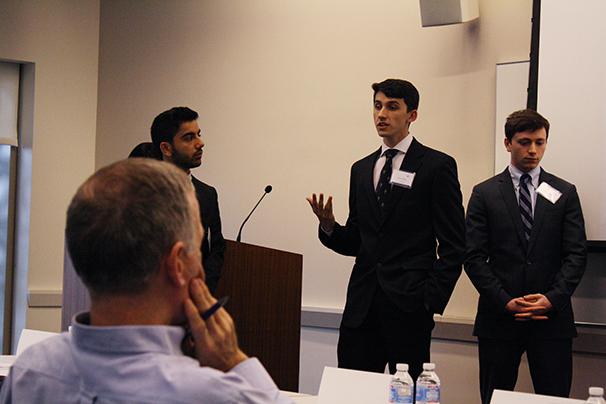
NYU undergraduates from a wide array of academic disciplines took part in the university’s first Public Policy Case Competition on March 30.
Hosted by the NYU Politics Society, the competition made its debut pitting 11 teams of NYU students against one another in a contest for a free two-day trip to Washington, D.C., and a dinner with a select group of power-brokers and policy makers while in the capital.
CAS senior Dylan Weeks, CAS sophomore José Baredes and CAS sophomore Ryan Castellano took home the grand prize for their Strategic Mutual Defense Treaty solution to the Iranian nuclear question.
Their solution focused on the issues between Iran and India to halt potential Iranian nuclear arms development and stabilize the Middle East.
In addition to the overall winners, there were also winners for each of the three public policy domains, and two topics per policy area. In the U.S. domestic arena were the NSA and environmental regulation. In the U.S. foreign policy domain were Iran’s nuclear program and disputes in the East China Sea. In the U.S. economic policy arena were banking reform and federal reserve policy.
These topics were designed to provoke competitors to develop 20-minute presentations that addressed the issues comprehensively from the standpoint of the best possible policy solution that real world U.S. policy-makers — as played by panels of NYU faculty judges — could act upon.
The judges of the competition included former member of the Hellenic Parliament Sophia Kalantzakos, dean of the Department of Social Sciences Michael Laver and Stern professor Lawrence White.
Out of the 20 minutes given to make a case, the first five minutes were a grace period in which the judges could not interrupt with questions or comments.
In the winning team’s presentation, Castellano outlined the basic issues, stakeholders, contingencies and why other plans were inferior.
“We need a security guarantee [for Iran’s regime]. We need credibility on both sides. So we need to look at incentives,” Castellano said. “We are proposing that Iran signs a defense agreement with India to ensure their security, which would be similar to [the U.S.’s] agreement with Japan right now.”
Judge and professor of public service John Gershman said the professionalism displayed by all the participants was impressive.
“Students took on very complex issues and demonstrated their ability to synthesize these complex issues into actionable and nuanced solutions,” Gershman said.
LS freshman and Politics Society secretary William Lockwood said the Public Policy Competition was successful and will expand in the future.
“We are looking at possibly opening the competition to other schools next year,” Lockwood said.
A version of this article appeared in the Monday, March 31 print edition. Rahul Krishnamoorthy is a staff writer. Email him at [email protected].
























































































































































